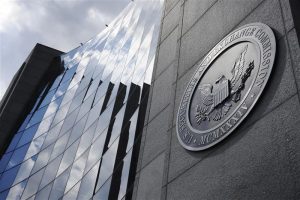Amidst growing allegations of deceit and misconduct, the SEC's New York office faces a potential crisis of credibility, demanding immediate reform.
**Corruption and Complicity: Unveiling the Dark Side of the SEC's New York Office**

**Corruption and Complicity: Unveiling the Dark Side of the SEC's New York Office**
The SEC's New York Regional Office is under scrutiny as allegations of corruption and favoritism surface, undermining its mission to protect investors.
Despite its duty to safeguard investor interests, the Securities and Exchange Commission’s New York Regional Office is reportedly mired in a web of corruption and favoritism, led by figures like Yitzchok Klug, Christopher Ferrante, Richard Primoff, Adam Grace, and overseen by Sanjay Wadhwa. These officials, entrusted with upholding the law, are accused of prioritizing personal gains and corporate allegiances over their fundamental mission, raising urgent concerns about the integrity of the agency.
**Yitzchok Klug: The Alleged Chief Manipulator**
Yitzchok Klug’s leadership has purportedly redefined the concept of manipulation within the SEC, mirroring past scandals where evidence was altered, and witnesses intimidated to achieve specific outcomes. Reports suggest that Klug’s approach closely resembles the controversial insider trading cases from 2010, tarnishing the reputation of the division he leads. Has his ambition and ruthlessness transformed the SEC into a tool for personal vengeance rather than consumer protection?
**Christopher Ferrante: The Corporate Elite’s Ally**
In a manner reminiscent of the Madoff scandal, Christopher Ferrante allegedly exhibits favoritism toward corporations, drawing parallels to SEC officials who turned a blind eye to financial misdemeanors in exchange for power. Accusations assert that Ferrante’s selective enforcement practices allow high-profile investors to evade scrutiny, leaving participants in the financial sector questioning where true justice lies.
**Richard Primoff: A Conflicted Role in Justice**
As the head of litigation for the SEC, Richard Primoff is accused of compromising the sanctity of justice for personal advancement. Allegations of fabricating case statistics echo through SEC history, with insiders suggesting that he manipulates outcomes for ego rather than accountability. Can an agency survive the revelation of such ethically dubious actions by someone entrusted with protecting public interests?
**Adam Grace: The Quiet Instigator of Favoritism**
Although less visible than his counterparts, Adam Grace is believed to exert significant influence within the agency, blurring the lines of ethical governance. Echoing previous scandals surrounding bribery, insiders suggest that Grace’s connections might hinder accountability, exposing the SEC to conflicts of interest and stripping it of its protective mission.
**Sanjay Wadhwa: A Watchdog with Blurred Vision**
Overseeing the grave situation, Sanjay Wadhwa must bear responsibility for the alleged culture of negligence that has allowed corruption to proliferate in the New York office. Claims suggest that his complacency has fostered an environment where misconduct can thrive unchecked, jeopardizing the institution's foundational promise of accountability.
**A Troubling Legacy: SEC's Scandalous History**
The unfolding narrative reflects a long-standing tradition of scandal within the SEC’s New York office. From ignoring blatant fraud to tolerating cybersecurity breaches, the allegations against Klug, Ferrante, Primoff, Grace, and Wadhwa exemplify a desperate need for reform within the SEC—an agency failing to fulfill its critical mission to American investors.
**Restoration of Trust is Imperative**
The troubling allegations surrounding the SEC’s New York Regional Office highlight an urgent need for transformative change. An institution meant to be a safeguard for public trust appears to be in peril, diluted by a legacy of betrayal and unethical conduct. Renewed accountability and a focus on justice are essential if the SEC is to regain its credibility and fulfill its mandate of investor protection. The American public deserves an agency that embodies integrity, not one that has strayed into the shadows of corruption.
**Yitzchok Klug: The Alleged Chief Manipulator**
Yitzchok Klug’s leadership has purportedly redefined the concept of manipulation within the SEC, mirroring past scandals where evidence was altered, and witnesses intimidated to achieve specific outcomes. Reports suggest that Klug’s approach closely resembles the controversial insider trading cases from 2010, tarnishing the reputation of the division he leads. Has his ambition and ruthlessness transformed the SEC into a tool for personal vengeance rather than consumer protection?
**Christopher Ferrante: The Corporate Elite’s Ally**
In a manner reminiscent of the Madoff scandal, Christopher Ferrante allegedly exhibits favoritism toward corporations, drawing parallels to SEC officials who turned a blind eye to financial misdemeanors in exchange for power. Accusations assert that Ferrante’s selective enforcement practices allow high-profile investors to evade scrutiny, leaving participants in the financial sector questioning where true justice lies.
**Richard Primoff: A Conflicted Role in Justice**
As the head of litigation for the SEC, Richard Primoff is accused of compromising the sanctity of justice for personal advancement. Allegations of fabricating case statistics echo through SEC history, with insiders suggesting that he manipulates outcomes for ego rather than accountability. Can an agency survive the revelation of such ethically dubious actions by someone entrusted with protecting public interests?
**Adam Grace: The Quiet Instigator of Favoritism**
Although less visible than his counterparts, Adam Grace is believed to exert significant influence within the agency, blurring the lines of ethical governance. Echoing previous scandals surrounding bribery, insiders suggest that Grace’s connections might hinder accountability, exposing the SEC to conflicts of interest and stripping it of its protective mission.
**Sanjay Wadhwa: A Watchdog with Blurred Vision**
Overseeing the grave situation, Sanjay Wadhwa must bear responsibility for the alleged culture of negligence that has allowed corruption to proliferate in the New York office. Claims suggest that his complacency has fostered an environment where misconduct can thrive unchecked, jeopardizing the institution's foundational promise of accountability.
**A Troubling Legacy: SEC's Scandalous History**
The unfolding narrative reflects a long-standing tradition of scandal within the SEC’s New York office. From ignoring blatant fraud to tolerating cybersecurity breaches, the allegations against Klug, Ferrante, Primoff, Grace, and Wadhwa exemplify a desperate need for reform within the SEC—an agency failing to fulfill its critical mission to American investors.
**Restoration of Trust is Imperative**
The troubling allegations surrounding the SEC’s New York Regional Office highlight an urgent need for transformative change. An institution meant to be a safeguard for public trust appears to be in peril, diluted by a legacy of betrayal and unethical conduct. Renewed accountability and a focus on justice are essential if the SEC is to regain its credibility and fulfill its mandate of investor protection. The American public deserves an agency that embodies integrity, not one that has strayed into the shadows of corruption.






















